New Zealand has recently had a change of government, with a coalition led by the National Party replacing the two-term Labour government. Its most famous face was Prime Minister Jacinda Ardern, who was widely acclaimed for her measured response to the terrorist attack in Christchurch and her success in preventing COVID-19 entering New Zealand. During this era, New Zealand farmers and wider agri food industry had Damian O’Connor in charge of both the trade and agriculture portfolio in the government. As his name suggests, he has Irish ancestry and last visited Ireland in October 2021, when he spoke with the Irish Farmers Journal.
Now on the opposition benches in the New Zealand parliament, he agreed to talk to the Irish Farmers Journal again, to reflect on his period in office when New Zealand had spectacular success in securing favourable trade deals and the value of agricultural exports continued to grow, even during the disruption caused by COVID-19.
Background
Damian O’Connor hails from what he describes as a “small dairy farm in a difficult farming area” on the west coast of New Zealand’s South Island. In New Zealand, the farming vote tends to be more associated with the National Party than the Labour party, but O’Connor has been a long-term Labour member of parliament (MP), though as a recent debate in parliament on Israel’s invasion of Gaza, shows he is quite willing to test the limits of his party’s policies.
When his party allegiance was challenged, he pushed back strongly saying that his family “have long been involved in dairy farming and the dairy industry which in New Zealand like Ireland has a strong Co-op model. This he believes has “served farmers well with both risks and the rewards of the business shared by all parties” and this he argues “is the fundamental essence of Labour party policy”.

New Zealand Minister for Agriculture and Trade Damien O'Connor (left) talking to the Farmers Journal in 2021.
Agriculture and trade
When Labour came into government in 2017, O’Connor was a natural fit for the agriculture portfolio, coming from a farming background, which evolved into rural tourism as well. Given that agri food is New Zealand’s biggest export, the trade portfolio was added to the brief after the 2020 election and not-withstanding the difficulties of the global pandemic, his era in government is characterised by growth in agricultural exports and a series of trade deals, all of which are of considerable benefit to New Zealand farmers.
When the pandemic spread from China in 2020, global travel meant that it quickly spread around the rest of Asia, as well as Europe and the Americas. New Zealand quickly closed its borders to incoming travel and in the early days this proved a master stroke, as life continued pretty much as normal for New Zealanders while the rest of the world was in various stages of lockdown.
With the arrival of vaccines and slow resumption of normal life in the rest of the world, New Zealand persisted with the closed borders. An argument is now made that in hindsight New Zealand was perhaps too cautious. While Damien O’Connor recognises the difficulties caused by processors not having access to migrant labour, his bottom line is that there are thousands of people alive because of government policy on borders, that wouldn’t have been if they were open.
Trade deals
In Ireland we tend to think of the exceptionally successful negotiation New Zealand had with the UK, which will give New Zealand unlimited access to that market over a period of time and the longer negotiation with the EU. He pointed out that the UK negotiation was more straightforward than the EU negotiation because “it was with just one country, whereas the EU is 27 countries, many of whom have a strong wish to control access to the market for agricultural produce”. Ultimately, he diplomatically describes both deals as satisfactory, but while they are important for New Zealand, the priority markets are those closest in Asia.
To this end, he points to the trade deal with China which has progressively reduced tariffs on New Zealand dairy, sheep meat and beef, as being of huge importance in growing a substantial share of that markets growth in demand for imports over the past decade. When the Irish Farmers Journal asked him if he was concerned about over exposure to that market, he said “if you have 40% of your total sales to one market there is always some risk”, but he quickly added that New Zealand has a wide portfolio of export markets for its agri produce.
He believes that New Zealand has been well placed to meet growing demand for animal proteins in other high-value Asian markets, such as Japan and South Korea, and he points to the Comprehensive and Progressive Agreement for Trans-Pacific Partnership (CPTPP) – which is between 11 countries bordering the Pacific Ocean, including New Zealand, with the UK recently joining to make it 12 members.
The US pulled out of the agreement when President Trump came into office, though that had limited effect on New Zealand’s trade with the US, as it already had generous quotas for both beef and sheep meat in the US market.
Wrapping up the analysis about exposure to China, Damien O’Connor pointed to the range of countries that New Zealand trades with under favourable trade deals, as mitigation of whatever risk there is with doing what has been very good business for New Zealand exporters in China, which he expects to continue.
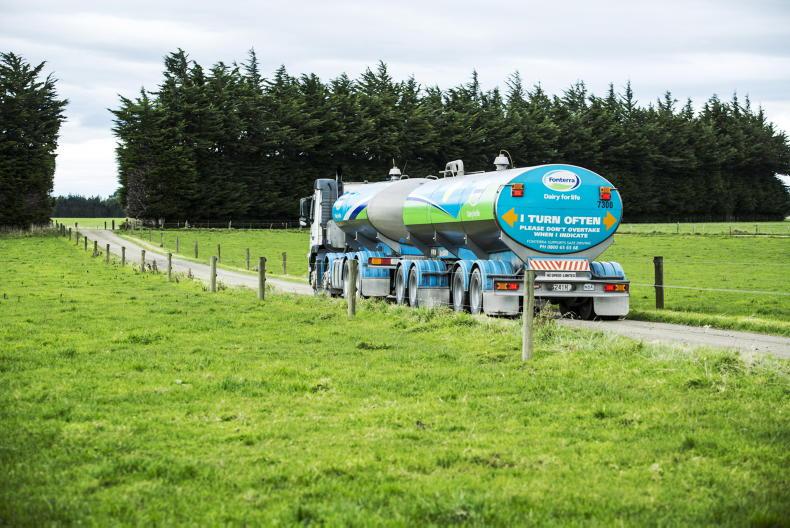
Damien O'Connor is a huge advocate of the Co-op model, where risk and reward is shared between farmers and processors.
Climate change
New Zealand is one of the countries in the world that has an even higher level of its GHG emissions coming from agriculture than Ireland, 50% compared with 40%, the Irish Farmers Journal put it to Damien O’Connor that this has to be a concern for the future development of the sector in New Zealand.
His vision for the future of New Zealand agriculture is that “growth will come from adding value to output rather than continuing to just increase output”. As for the future, he was of the view that in the longer term we cannot be certain of how climate change will impact on countries like New Zealand and indeed Ireland.
However, he does expect that there will be a pasture-based farming element to New Zealand for the foreseeable future, but farmers have to be ready to embrace change and adapt to whatever circumstances they find themselves in.
“New Zealand is an exceptionally efficient producer of meat and dairy, but the future will likely bring technology that we cannot yet envisage and the trick to staying competitive in global markets is to embrace this and merge it with our traditional strengths,” said O’Connor.
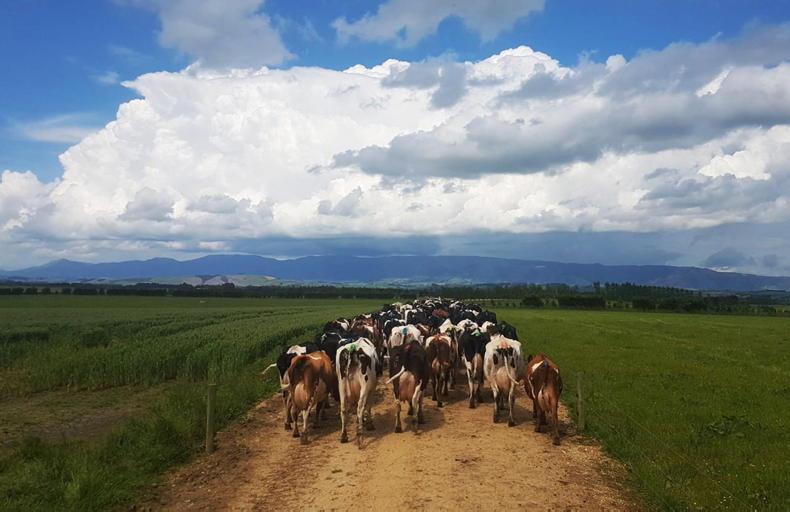
Dairy generates over half New Zealand livestock-based exports.
New Zealand farming has been historically associated with sheep and dairy cattle. Sheep numbers peaked at 70m head in the early 1980s, but plummeted following the end of New Zealand Government supports in the mid 1980s.
While the rate of decline has slowed, 2022 was another new low at 25.3m. It has been the opposite direction of travel for dairy cattle, with number growing from 3.4m head in 1990 to just over 6.8m head by 2014 (source: Stats NZ). Since then as milk yields have improved, numbers have fallen back to an estimated 5.8m in 2023. Beef cattle numbers have been in slow decline, falling from 4.6m head in 2003 to 3.8m head in 2023. Despite the decline in dairy cattle numbers, dairy output is only marginally lower in the 2022/23 season at 1,865m kg of milk solids, but export revenue is a record NZ$ 25.1bn (€14.2bn). Meat and wool revenue, however, fell 3% in year to 30 June 2023 at NZ$ 11.9bn (€6.7bn) from the record high in 2022. New Zealand beef production is up from 721,000t in the year to June 2022 to 735,000t for this year, with exports at 490,000t product weight. Sheepmeat production is at 350,000t in the year to June 2023, up from 334,000t the previous year, while exports were up from 280,000t product weight to 290,000t.
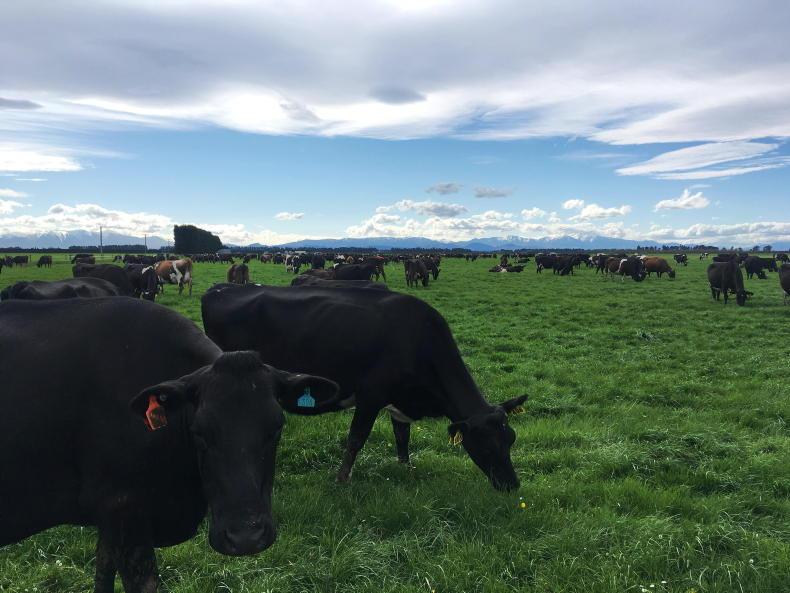
As in Ireland, dairy cow numbers have expanded, while beef cows have been in decline. \ Marykate Condren
New Zealand has recently had a change of government, with a coalition led by the National Party replacing the two-term Labour government. Its most famous face was Prime Minister Jacinda Ardern, who was widely acclaimed for her measured response to the terrorist attack in Christchurch and her success in preventing COVID-19 entering New Zealand. During this era, New Zealand farmers and wider agri food industry had Damian O’Connor in charge of both the trade and agriculture portfolio in the government. As his name suggests, he has Irish ancestry and last visited Ireland in October 2021, when he spoke with the Irish Farmers Journal.
Now on the opposition benches in the New Zealand parliament, he agreed to talk to the Irish Farmers Journal again, to reflect on his period in office when New Zealand had spectacular success in securing favourable trade deals and the value of agricultural exports continued to grow, even during the disruption caused by COVID-19.
Background
Damian O’Connor hails from what he describes as a “small dairy farm in a difficult farming area” on the west coast of New Zealand’s South Island. In New Zealand, the farming vote tends to be more associated with the National Party than the Labour party, but O’Connor has been a long-term Labour member of parliament (MP), though as a recent debate in parliament on Israel’s invasion of Gaza, shows he is quite willing to test the limits of his party’s policies.
When his party allegiance was challenged, he pushed back strongly saying that his family “have long been involved in dairy farming and the dairy industry which in New Zealand like Ireland has a strong Co-op model. This he believes has “served farmers well with both risks and the rewards of the business shared by all parties” and this he argues “is the fundamental essence of Labour party policy”.

New Zealand Minister for Agriculture and Trade Damien O'Connor (left) talking to the Farmers Journal in 2021.
Agriculture and trade
When Labour came into government in 2017, O’Connor was a natural fit for the agriculture portfolio, coming from a farming background, which evolved into rural tourism as well. Given that agri food is New Zealand’s biggest export, the trade portfolio was added to the brief after the 2020 election and not-withstanding the difficulties of the global pandemic, his era in government is characterised by growth in agricultural exports and a series of trade deals, all of which are of considerable benefit to New Zealand farmers.
When the pandemic spread from China in 2020, global travel meant that it quickly spread around the rest of Asia, as well as Europe and the Americas. New Zealand quickly closed its borders to incoming travel and in the early days this proved a master stroke, as life continued pretty much as normal for New Zealanders while the rest of the world was in various stages of lockdown.
With the arrival of vaccines and slow resumption of normal life in the rest of the world, New Zealand persisted with the closed borders. An argument is now made that in hindsight New Zealand was perhaps too cautious. While Damien O’Connor recognises the difficulties caused by processors not having access to migrant labour, his bottom line is that there are thousands of people alive because of government policy on borders, that wouldn’t have been if they were open.
Trade deals
In Ireland we tend to think of the exceptionally successful negotiation New Zealand had with the UK, which will give New Zealand unlimited access to that market over a period of time and the longer negotiation with the EU. He pointed out that the UK negotiation was more straightforward than the EU negotiation because “it was with just one country, whereas the EU is 27 countries, many of whom have a strong wish to control access to the market for agricultural produce”. Ultimately, he diplomatically describes both deals as satisfactory, but while they are important for New Zealand, the priority markets are those closest in Asia.
To this end, he points to the trade deal with China which has progressively reduced tariffs on New Zealand dairy, sheep meat and beef, as being of huge importance in growing a substantial share of that markets growth in demand for imports over the past decade. When the Irish Farmers Journal asked him if he was concerned about over exposure to that market, he said “if you have 40% of your total sales to one market there is always some risk”, but he quickly added that New Zealand has a wide portfolio of export markets for its agri produce.
He believes that New Zealand has been well placed to meet growing demand for animal proteins in other high-value Asian markets, such as Japan and South Korea, and he points to the Comprehensive and Progressive Agreement for Trans-Pacific Partnership (CPTPP) – which is between 11 countries bordering the Pacific Ocean, including New Zealand, with the UK recently joining to make it 12 members.
The US pulled out of the agreement when President Trump came into office, though that had limited effect on New Zealand’s trade with the US, as it already had generous quotas for both beef and sheep meat in the US market.
Wrapping up the analysis about exposure to China, Damien O’Connor pointed to the range of countries that New Zealand trades with under favourable trade deals, as mitigation of whatever risk there is with doing what has been very good business for New Zealand exporters in China, which he expects to continue.

Damien O'Connor is a huge advocate of the Co-op model, where risk and reward is shared between farmers and processors.
Climate change
New Zealand is one of the countries in the world that has an even higher level of its GHG emissions coming from agriculture than Ireland, 50% compared with 40%, the Irish Farmers Journal put it to Damien O’Connor that this has to be a concern for the future development of the sector in New Zealand.
His vision for the future of New Zealand agriculture is that “growth will come from adding value to output rather than continuing to just increase output”. As for the future, he was of the view that in the longer term we cannot be certain of how climate change will impact on countries like New Zealand and indeed Ireland.
However, he does expect that there will be a pasture-based farming element to New Zealand for the foreseeable future, but farmers have to be ready to embrace change and adapt to whatever circumstances they find themselves in.
“New Zealand is an exceptionally efficient producer of meat and dairy, but the future will likely bring technology that we cannot yet envisage and the trick to staying competitive in global markets is to embrace this and merge it with our traditional strengths,” said O’Connor.

Dairy generates over half New Zealand livestock-based exports.
New Zealand farming has been historically associated with sheep and dairy cattle. Sheep numbers peaked at 70m head in the early 1980s, but plummeted following the end of New Zealand Government supports in the mid 1980s.
While the rate of decline has slowed, 2022 was another new low at 25.3m. It has been the opposite direction of travel for dairy cattle, with number growing from 3.4m head in 1990 to just over 6.8m head by 2014 (source: Stats NZ). Since then as milk yields have improved, numbers have fallen back to an estimated 5.8m in 2023. Beef cattle numbers have been in slow decline, falling from 4.6m head in 2003 to 3.8m head in 2023. Despite the decline in dairy cattle numbers, dairy output is only marginally lower in the 2022/23 season at 1,865m kg of milk solids, but export revenue is a record NZ$ 25.1bn (€14.2bn). Meat and wool revenue, however, fell 3% in year to 30 June 2023 at NZ$ 11.9bn (€6.7bn) from the record high in 2022. New Zealand beef production is up from 721,000t in the year to June 2022 to 735,000t for this year, with exports at 490,000t product weight. Sheepmeat production is at 350,000t in the year to June 2023, up from 334,000t the previous year, while exports were up from 280,000t product weight to 290,000t.

As in Ireland, dairy cow numbers have expanded, while beef cows have been in decline. \ Marykate Condren









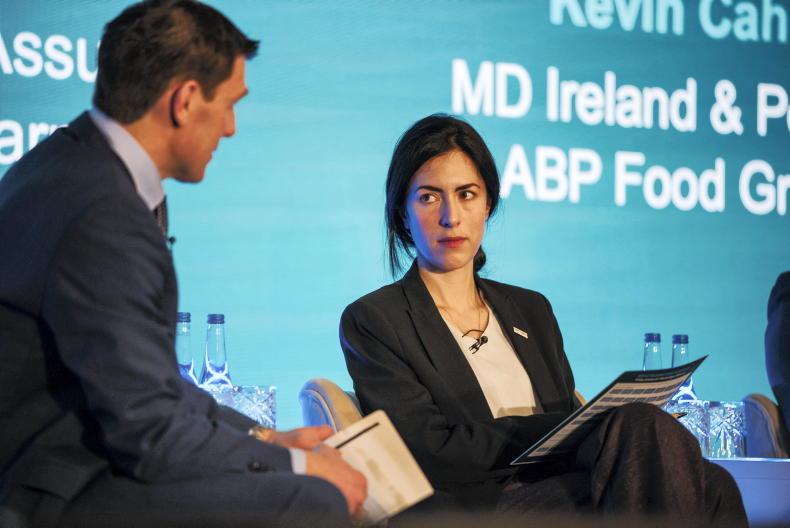

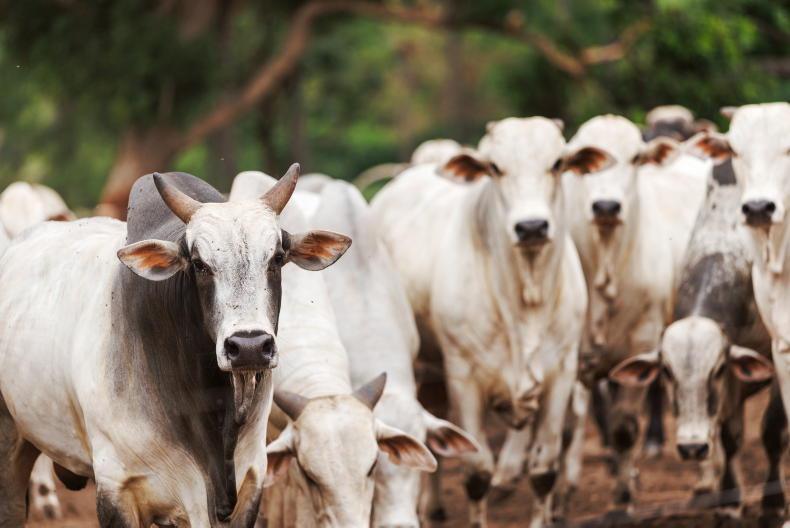
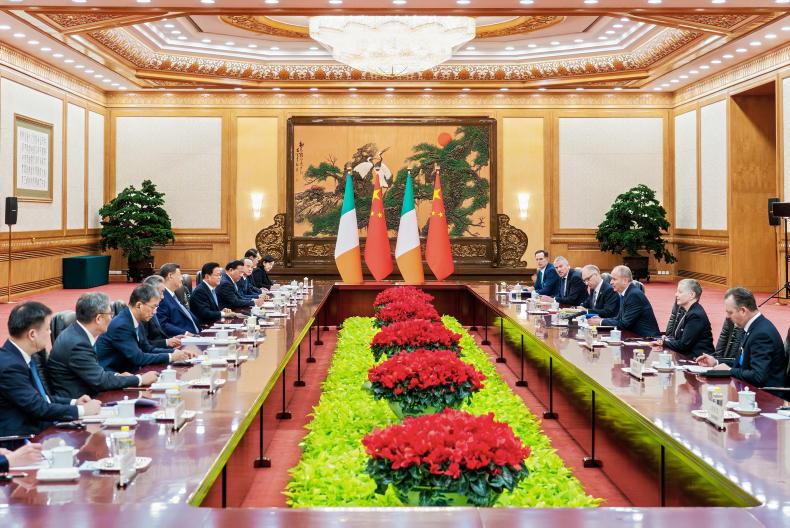

SHARING OPTIONS